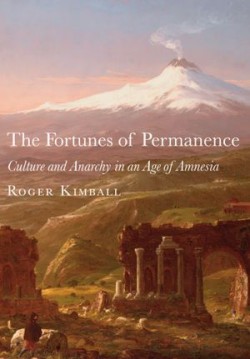 Fans of the old television show The Fugitive may remember the striking sequence that opened each episode. First we glimpse a man, handcuffed, sitting on a train, just staring out the window, and then we hear the portentous voiceover: “Richard Kimble looks out on the world for the last time and sees only darkness.” Pause. “But in that darkness Fate moves its huge hand.” At which point the train loudly crashes, and in the next scene Kimble is running through the underbrush, then stumbling and falling into some muddy water, still manacled, as the words “The Fugitive” flash across the family’s black-and-white Sylvania TV screen.
Fans of the old television show The Fugitive may remember the striking sequence that opened each episode. First we glimpse a man, handcuffed, sitting on a train, just staring out the window, and then we hear the portentous voiceover: “Richard Kimble looks out on the world for the last time and sees only darkness.” Pause. “But in that darkness Fate moves its huge hand.” At which point the train loudly crashes, and in the next scene Kimble is running through the underbrush, then stumbling and falling into some muddy water, still manacled, as the words “The Fugitive” flash across the family’s black-and-white Sylvania TV screen.
Anyway, that’s how I remember it, though I may be wrong on a few details.
This opening, repeated week after week, came to mind as I recently dipped into The Fortunes of Permanence, an exceptional new volume of essays by the editor/publisher of The New Criterion. Change but a word or two, et voilà: “Roger Kimball looks out on the world and sees only darkness. But in that darkness Fate moves its huge hand.” Certainly, this eminent, if oft vilified, conservative intellectual perceives our country as assailed from without by fanatics, corrupted from within by political and cultural relativism. And he clearly hopes for a miraculous return to sanity, repeatedly stressing the established principles of western morality, the necessity of standards, and the bulwark and safeguard of tradition.
What interests me about Kimball isn’t whether he is right or not about most political issues. Drawing on a capacious intelligence and a flair for the well-chosen quotation, he is an excellent and often convincing polemicist. Nonetheless, he frequently exhibits the slash-and-burn zeal of a high-school debate champion, always going for the kill, seldom allowing for nuance or reservation or uncertainty. Just say the word “Obama,” for instance, and he grows apoplectic. But Roger Kimball is, whatever else he might be, a man of principle. I say this, even while acknowledging that my own political beliefs are utterly simple and may be reduced to a few shocking words: Listen to the young. Those under 30 see the iniquities of the world and are willing to challenge the status quo. Fathers and mothers of families seldom rock the boat; they can’t afford to risk losing what they have. Kimball would interject, Thank heaven for that saving grace.
Still, when it comes to education, literature, and art, Kimball strikes me as a model of good sense. This is troubling: if our tastes are so often congruent in cultural matters, perhaps I need to reexamine my supposed political convictions more closely? In The Fortunes of Permanence, for instance, Kimball reprints essays in defense of John Buchan, Rudyard Kipling, and G. K. Chesterton—three of my favorite writers, all of them now frequently derided as jingoist, imperialist, and racist. Any good reader must instinctively loathe the kind of reductionist presentism and ethnocentrism that condescends to such great storytellers and artists, or dismisses a magnificent book like Kim as a collection of western prejudices. Such knee-jerk attitudes, as Kimball writes, aim “to short-circuit, not refine, our powers of discrimination.”
Because I admire the cultural coverage of The New Criterion, I’ve twice written for the magazine, once on the poetry of Stephen Crane and this spring on the work of Philip Larkin. The kind invitations to do so came from the executive editor and poet David Yezzi, who is now researching a biography of Anthony Hecht, among the greatest American poets of our time (as well as a man I counted as a friend). Indeed, nearly all the magazine’s reviewing—of books, art, and music—is first-rate. The poetry featured is comparably exceptional, with a strong preference for formal verse (which is just fine by me). Nonetheless, I still bristle and groan at the political and editorial snarkiness at the front of the book and in some of its columns.
In his famous elegy for W. B. Yeats, Auden said that, despite Yeats’s various forms of foolishness, Time would pardon him for writing well. I tend to feel that way about many of the literary controversialists of our time, whether Christopher Hitchens, William F. Buckley, Mark Steyn, Gore Vidal, Nat Hentoff, or Roger Kimball. Of course, Auden also sternly warned against those who read the Bible not for its message but only for the beauty of its prose.
All these disparate journalists, it is clear, possess a formidable self-confidence, sometimes verging on smugness. There’s nothing pallid or wishy-washy about them or their views. And perhaps just because of this they all produce (or produced) exhilarating essays and articles—even when they drive you up the wall, or really Go Too Far. But, as the French say, they also give you furiously to think.
Sigh. I myself sometimes wish that I could be as sure of anything as many writers seem to be about everything. But then I am burdened by having taken to heart, long ago, Cromwell’s immortal reply to the Church of Scotland: “I beseech you, in the bowels of Christ, think it possible you may be mistaken.” Not really the ideal motto for a critic, but there you are.

